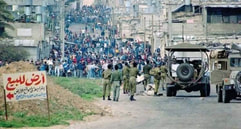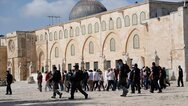9 dec 2019

The First Palestinian Uprising or ‘Intifada’ broke out across occupied Palestine on December 8, 1987, lasting for more than six years, saw the deaths of thousands of Palestinians by Israeli occupation forces, and the detention of tens of thousands.
On that day 32 years ago, Israeli settler, Herzel Boukiza, rammed his vehicle into Palestinian workers returning home through the Erez/Beit Hanoun checkpoint between Israel and Gaza.
Four Palestinian workers from Jabalia and Maghazi in the Gaza Strip were killed in the attack, the Palestinian News and Info Agency (WAFA) reported.
The next day, December 9, 1987 and following the funerals of the four martyrs, angry Palestinians took to the streets in Jabalia to protest the premeditated attack.
As Palestinian leaders gathered to discuss the escalating situation, protests and clashes broke out within the refugee camps, spreading rapidly across the West Bank. Shopkeepers closed their businesses and laborers refused to go to their workplaces in Israel.
Palestinians took control of neighborhoods, barricading roads to prevent Israeli army vehicles from entering. Largely unarmed, they defended themselves only by throwing stones at the soldiers and their tanks.
After six years of daily confrontations in which the Israeli army killed a total of 1550 Palestinians, injured more than 70,000 by shattering bones and beatings, and detained 100,000 to 200,000.
Over 18,000 Palestinians were held under administrative detention for long periods of time without charge or trial, a practice Israel continues to utilize.
The “stones Intifada” came to a halt after the signing of the Palestinian-Israeli Oslo Accords in September 1993, which led to the creation of the Palestinian Authority, and allowed thousands of the Palestinian Diaspora to return home for the first time since being forced out of Palestine in 1948.
Watch here to see Israeli soldiers beating Palestinians with rocks to break their bones.
On that day 32 years ago, Israeli settler, Herzel Boukiza, rammed his vehicle into Palestinian workers returning home through the Erez/Beit Hanoun checkpoint between Israel and Gaza.
Four Palestinian workers from Jabalia and Maghazi in the Gaza Strip were killed in the attack, the Palestinian News and Info Agency (WAFA) reported.
The next day, December 9, 1987 and following the funerals of the four martyrs, angry Palestinians took to the streets in Jabalia to protest the premeditated attack.
As Palestinian leaders gathered to discuss the escalating situation, protests and clashes broke out within the refugee camps, spreading rapidly across the West Bank. Shopkeepers closed their businesses and laborers refused to go to their workplaces in Israel.
Palestinians took control of neighborhoods, barricading roads to prevent Israeli army vehicles from entering. Largely unarmed, they defended themselves only by throwing stones at the soldiers and their tanks.
After six years of daily confrontations in which the Israeli army killed a total of 1550 Palestinians, injured more than 70,000 by shattering bones and beatings, and detained 100,000 to 200,000.
Over 18,000 Palestinians were held under administrative detention for long periods of time without charge or trial, a practice Israel continues to utilize.
The “stones Intifada” came to a halt after the signing of the Palestinian-Israeli Oslo Accords in September 1993, which led to the creation of the Palestinian Authority, and allowed thousands of the Palestinian Diaspora to return home for the first time since being forced out of Palestine in 1948.
Watch here to see Israeli soldiers beating Palestinians with rocks to break their bones.
30 sept 2019
On Sunday, Palestinian political figured took part in a seminar to remember the intifada. Palestinians believe the intifada is still ongoing as they are not hesitant about sacrificing their lives defending Palestine.
They say resistance is the only means for Palestinians to protect Jerusalem al-Quds from Israeli violations.
Palestinians say they are determined to defend Jerusalem al-Quds by all means and at all costs. In Gaza, people stage weekly rallies to demand their right of return to their homeland.
Israeli forces have killed hundreds of protesters during the weekly rallies so far and injured many more.
People here say Israel’s violations and its use of excessive force against peaceful protesters won’t stop them from speaking out against Israeli crimes.
They say intifada is still alive in their hearts and minds and they will continue to defend their rights.
They say resistance is the only means for Palestinians to protect Jerusalem al-Quds from Israeli violations.
Palestinians say they are determined to defend Jerusalem al-Quds by all means and at all costs. In Gaza, people stage weekly rallies to demand their right of return to their homeland.
Israeli forces have killed hundreds of protesters during the weekly rallies so far and injured many more.
People here say Israel’s violations and its use of excessive force against peaceful protesters won’t stop them from speaking out against Israeli crimes.
They say intifada is still alive in their hearts and minds and they will continue to defend their rights.
28 sept 2019
|
|
The memory of former Israeli Prime Minister Ariel Sharon, then head of the Likud Party, breaking, along with other Israeli right-wing officials, into Al-Aqsa Mosque in Jerusalem on September 28, 2000, still lives in the hearts and minds of Palestinians everywhere, who remember that event as the spark that triggered the second Palestinian intifada, or uprising, against the Israeli occupation.
Palestinians clashed with the Israeli forces providing protection to Sharon and his entourage resulting in dozens of injuries among the Palestinians and Israeli police. The provocative visit came on a Thursday, and the next day was Friday, when thousands of Muslims usually attend the Friday prayer at Al-Aqsa Mosque, Islam’s third holiest site. The Israeli police was present in full force in Jerusalem and particularly its |
Old City and Al-Aqsa Mosque. Their presence provoked the worshippers, and eventually resulted in serious confrontations during which the police was set at using lethal force against the worshippers killing six and wounding hundreds others.
Angry at the killings in Jerusalem, protests broke out the next day in all the occupied Palestinian territories. On this day, Israeli forces killed 13 protesters and injured over 600 others, and the day after they killed another 10 and wounded hundreds others.
This bloody scene spread to even the Palestinians in Israel, who came out on October 1 to protest the Israeli killing of dozens of their fellow Palestinians in the occupied territories. Israeli police reacted violently to the protests and shot dead 13 Palestinian citizens of Israel over the next few days.
With the large number of killings, the intifada took a more violent course as guns were used for the first time since the start of the peace process in the early 1990s and Israel, headed by Ariel Sharon, used warplanes to assassinate Palestinian fighters and leaders and destroy Palestinian buildings, while Palestinians resorted to suicide attacks inside Israel.
As a result, Israel reoccupied the Palestinian cities in the West Bank starting 2002, most prominently Ramallah, the base of the Palestinian Authority and its leader Yasser Arafat, who came under siege in his headquarters until his death in November 2004. It built the infamous separation wall that destroyed thousands of dunums of agricultural Palestinian lands and erected road blocks everywhere.
The intifada went on until 2005, when it ended with a renewed hope for revival of the peace process under the new leadership of President Mahmoud Abbas but not before it claimed the lives of thousands of Palestinians and the heavy destruction of their cities and institutions.
Angry at the killings in Jerusalem, protests broke out the next day in all the occupied Palestinian territories. On this day, Israeli forces killed 13 protesters and injured over 600 others, and the day after they killed another 10 and wounded hundreds others.
This bloody scene spread to even the Palestinians in Israel, who came out on October 1 to protest the Israeli killing of dozens of their fellow Palestinians in the occupied territories. Israeli police reacted violently to the protests and shot dead 13 Palestinian citizens of Israel over the next few days.
With the large number of killings, the intifada took a more violent course as guns were used for the first time since the start of the peace process in the early 1990s and Israel, headed by Ariel Sharon, used warplanes to assassinate Palestinian fighters and leaders and destroy Palestinian buildings, while Palestinians resorted to suicide attacks inside Israel.
As a result, Israel reoccupied the Palestinian cities in the West Bank starting 2002, most prominently Ramallah, the base of the Palestinian Authority and its leader Yasser Arafat, who came under siege in his headquarters until his death in November 2004. It built the infamous separation wall that destroyed thousands of dunums of agricultural Palestinian lands and erected road blocks everywhere.
The intifada went on until 2005, when it ended with a renewed hope for revival of the peace process under the new leadership of President Mahmoud Abbas but not before it claimed the lives of thousands of Palestinians and the heavy destruction of their cities and institutions.
20 aug 2019

Jordanian lawmakers have called on the government to expel Israel’s ambassador and review a 1994 peace treaty with Tel Aviv in protest at the regime’s recent provocations and violation of international law at the al-Aqsa Mosque compound.
During an emergency parliamentary session attended by Jordanian Foreign Minister Ayman Safadi in Amman on Monday, members of the House of Representative discussed 17 non-binding recommendations on Amman’s relations with Tel Aviv, Jordan’s Al-Mamlaka TV reported.
The recommendations included “expelling the ambassador of the Zionist entity in Amman,” closing the Israeli embassy, recalling Jordan’s ambassador to Tel Aviv, halting “all forms of normalization,” reviewing the 1994 peace treaty, affirming the size of the 144-dunam Al-Aqsa Mosque compound, backing Jordan’s continued custodianship of the holy site, and rejecting an Israeli plot to divide the sacred area into Muslim-only and Jewish-only sections.
Jordan and Egypt are the only Arab countries that have formal relations with the regime in Israel.
On August 11, which marked the Muslim occasion of Eid al-Adha (Feast of Sacrifice), Israeli forces attacked Palestinian worshipers at the al-Aqsa Mosque compound, prompting violent clashes at the site.
The violence erupted after Israeli policemen fired stun grenades and tear gas at the Palestinians who had finished their Eid prayers at the compound, allowing, in a rare move, Israeli settlers to enter the holy site to mark the fasting and mourning day of Tisha B’Av.
According to the Palestinian Red Crescent, the clashes had left 61 Palestinians wounded.
Two days after the confrontations, Israeli Public Security Minister Gilad Erdan said that he believes the status quo at the al-Aqsa Mosque compound should be changed to allow Israelis to pray there.
He also estimated that 1,729 Israelis had entered the compound on August 11.
Speaking at Monday’s parliamentary session, Jordanian Foreign Minister Ayman Safadi stressed his country’s “unwavering position” on Israeli-occupied Jerusalem al-Quds as a redline, adding that protecting Islamic and Christian holy sites in the occupied city is a “responsibility” of Amman.
Jordan, he added, “will do its utmost to protect the holy sites and face the futile Israeli actions targeting them.
We condemn the Israeli occupation authorities’ provocative practices and ongoing violation of international law, as well as their attempts change the historical and legal situation in occupied Jerusalem and its holy sites.”
The top Jordanian diplomat also warned that Israel’s actions will “aggravate the conflict, increase tensions and lead to an explosion, thus threatening international peace and security.”
Meanwhile, House of Representatives Speaker Atef Tarawneh called an informal voice vote to accept the recommendations, after which many MPs shouted their agreement.
He further urged the government to relay a message to Israel that “peace is threatened in light of its continued aggression against Jerusalem and al-Aqsa Mosque.”
After the meeting, Yahya al-Saud, head of the parliament’s Palestine committee, said the lawmakers had agreed to hold a sit-in at the Allenby Bridge, which connects the occupied West Bank with Jordan, on Friday.
On Sunday, Jordan’s Ministry of Foreign Affairs summoned the Israeli ambassador to Amman and asked him to convey a message to the Tel Aviv regime that it “must immediately cease all violations and attempts aimed at changing the historical and legal situation in the holy compound.”
On the same day, Safadi met with European Union representatives to “stress urgency of effective int’l steps against Israeli violations of holy sites in occupied Jerusalem (al-Quds).”
The Jewish visitation of al-Aqsa is permitted, but, according to an agreement signed between Israel and the Jordanian government after Israel’s occupation of East Jerusalem (al-Quds) in 1967, non-Muslim worship at the compound is prohibited.
During an emergency parliamentary session attended by Jordanian Foreign Minister Ayman Safadi in Amman on Monday, members of the House of Representative discussed 17 non-binding recommendations on Amman’s relations with Tel Aviv, Jordan’s Al-Mamlaka TV reported.
The recommendations included “expelling the ambassador of the Zionist entity in Amman,” closing the Israeli embassy, recalling Jordan’s ambassador to Tel Aviv, halting “all forms of normalization,” reviewing the 1994 peace treaty, affirming the size of the 144-dunam Al-Aqsa Mosque compound, backing Jordan’s continued custodianship of the holy site, and rejecting an Israeli plot to divide the sacred area into Muslim-only and Jewish-only sections.
Jordan and Egypt are the only Arab countries that have formal relations with the regime in Israel.
On August 11, which marked the Muslim occasion of Eid al-Adha (Feast of Sacrifice), Israeli forces attacked Palestinian worshipers at the al-Aqsa Mosque compound, prompting violent clashes at the site.
The violence erupted after Israeli policemen fired stun grenades and tear gas at the Palestinians who had finished their Eid prayers at the compound, allowing, in a rare move, Israeli settlers to enter the holy site to mark the fasting and mourning day of Tisha B’Av.
According to the Palestinian Red Crescent, the clashes had left 61 Palestinians wounded.
Two days after the confrontations, Israeli Public Security Minister Gilad Erdan said that he believes the status quo at the al-Aqsa Mosque compound should be changed to allow Israelis to pray there.
He also estimated that 1,729 Israelis had entered the compound on August 11.
Speaking at Monday’s parliamentary session, Jordanian Foreign Minister Ayman Safadi stressed his country’s “unwavering position” on Israeli-occupied Jerusalem al-Quds as a redline, adding that protecting Islamic and Christian holy sites in the occupied city is a “responsibility” of Amman.
Jordan, he added, “will do its utmost to protect the holy sites and face the futile Israeli actions targeting them.
We condemn the Israeli occupation authorities’ provocative practices and ongoing violation of international law, as well as their attempts change the historical and legal situation in occupied Jerusalem and its holy sites.”
The top Jordanian diplomat also warned that Israel’s actions will “aggravate the conflict, increase tensions and lead to an explosion, thus threatening international peace and security.”
Meanwhile, House of Representatives Speaker Atef Tarawneh called an informal voice vote to accept the recommendations, after which many MPs shouted their agreement.
He further urged the government to relay a message to Israel that “peace is threatened in light of its continued aggression against Jerusalem and al-Aqsa Mosque.”
After the meeting, Yahya al-Saud, head of the parliament’s Palestine committee, said the lawmakers had agreed to hold a sit-in at the Allenby Bridge, which connects the occupied West Bank with Jordan, on Friday.
On Sunday, Jordan’s Ministry of Foreign Affairs summoned the Israeli ambassador to Amman and asked him to convey a message to the Tel Aviv regime that it “must immediately cease all violations and attempts aimed at changing the historical and legal situation in the holy compound.”
On the same day, Safadi met with European Union representatives to “stress urgency of effective int’l steps against Israeli violations of holy sites in occupied Jerusalem (al-Quds).”
The Jewish visitation of al-Aqsa is permitted, but, according to an agreement signed between Israel and the Jordanian government after Israel’s occupation of East Jerusalem (al-Quds) in 1967, non-Muslim worship at the compound is prohibited.
13 aug 2019

Kuwaiti Speaker of the National Assembly Marzouq al-Ghanim has called for a Arab, Islamic and international action to put real pressure on the Israeli occupation state after its police forces attacked Muslim worshipers at the Aqsa Mosque and allowed Jewish settlers to defile it on the first day of Eid al-Adha.
In recent press remarks, Ghanim said the Israeli police’s brutal attacks on Muslim worshipers at the Aqsa Mosque on the morning of Eid al-Adha vindicated further that all peace calls and plans were fake and that the occupation entity only knows the language of force.
“It is shameful to leave the Jerusalemites, and the Palestinians in general confront the enemy alone with no support,” the Kuwait official underlined.
In recent press remarks, Ghanim said the Israeli police’s brutal attacks on Muslim worshipers at the Aqsa Mosque on the morning of Eid al-Adha vindicated further that all peace calls and plans were fake and that the occupation entity only knows the language of force.
“It is shameful to leave the Jerusalemites, and the Palestinians in general confront the enemy alone with no support,” the Kuwait official underlined.

